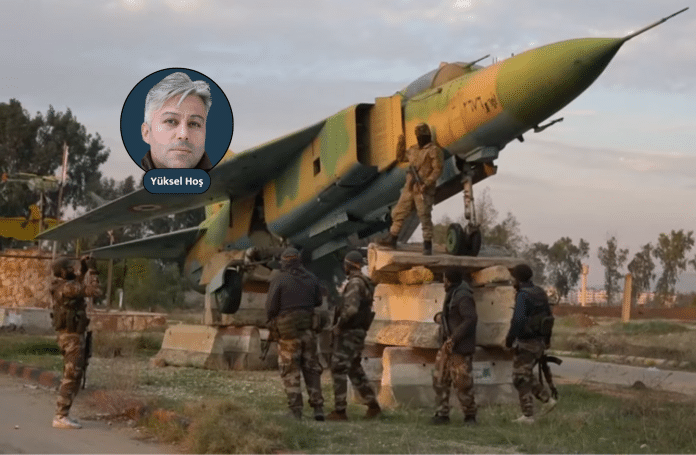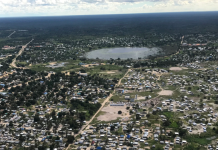The recent unraveling of Syria’s statehood defies conventional geopolitical analysis and challenges any rational explanation.
A nation that once appeared solid in its position has crumbled before our eyes. The sudden disappearance of its leader and the swift capitulation of the minority community he represented evoke a profound sense of disbelief. What once seemed like a formidable defense of Syria’s strategic regions is now being handed over with alarming ease, almost as if part of a larger plan, one that remains shrouded in secrecy.
The shocking lack of resistance in key cities like Latakia, a city symbolic of the regime, speaks to a deeper phenomenon than military failure alone. The absence of a significant defense represents not only tactical weaknesses but a profound social and psychological collapse. Overwhelmed by years of war, the Syrian people have responded with unexpected passivity—what seems to be a collective surrender. This echoes the fall of Thessaloniki and Monastir (today Bitola) during the Balkan Wars, where the local Turkish populations, exhausted and demoralized, chose capitulation over resistance. Today, a similar dissolution of national identity and solidarity seems to be unfolding in Syria. Let us explain this phenomenon…
The lack of significant defense by the Syrian army in a city like Latakia—one of the regime’s most prized strongholds—presents a situation that requires more than just military analysis. It speaks volumes when examined through sociological and psychological lenses. The spontaneous surrender of the people, the reluctance to fight, calls to mind the scenes from the Balkan Wars, when the people of Thessaloniki and Manastir—gripped by a sense of futility—were forced to acquiesce with cries of “surrender.” This isn’t just about war fatigue; it’s about a broader collapse within the social fabric, fueled by a governance system that is uncertain and plagued by deep, complex narratives.
The invisible hand of power
In order to try to understand the situation, we must start with Michel Foucault. Faucault’s observation that “power sometimes operates like an invisible hand, creating submission not through direct repression, but through the compliance of individuals themselves” seems particularly apt here. It’s a kind of surrender that emerges not from an external force, but from the psyche of those caught in the web of fear and confusion. The people’s capitulation, then, could be seen as a consequence of a failure in leadership, or perhaps it is a broader symptom of a regional situation manipulated by global powers who treat it like a stage for their own agendas.
Consider the sheer symbolism of Latakia’s abandonment: the strategic and ideological blunders of the regime’s leadership, the Russian base caught off guard, the people flooding the streets not to resist but to surrender. This is not just a military defeat. It is the unraveling of a society’s very will to resist, an erosion of the collective resolve that once bound the people to their land. And what does this surrender mean? Is it simply an act of war-weariness, or is it a deeper sign of something more insidious—a loss of identity, purpose, and agency?
The real tragedy here is not only in the destruction and loss of life, but in the fact that a once vibrant society has allowed itself to dissolve in the face of uncertainty. The people of Latakia, like those of so many other places throughout history, found themselves caught between the competing forces of their leaders’ incompetence and the cold manipulation of outside powers. What is left after the fall of such a city? A people who are no longer capable of defending themselves, not because they lack the strength, but because the very notion of fighting has been so eroded from their consciousness. This is not just the fall of a city; it’s the silent decay of a nation’s spirit
Michel Foucault’s concept of power as an “invisible hand” that induces surrender from within rather than through direct oppression is particularly apt for understanding Syria’s current plight. This internalized submission appears visible in the Syrian population’s passive surrender. Is this a result of strategic blunders by Syria’s leadership, or part of a larger, global power play, using the region as a mere stage for its own interests?
Sociological collapse
The surrender of a city like Latakia, the abandonment of a Russian military base, and the sight of people flooding into the streets—not to resist but to submit—signals something far more profound than military failure. It suggests a sociological collapse, aligning with Antonio Gramsci’s idea of a “moral and intellectual crisis” during periods of historical transition. Exhausted by endless conflict, the Syrian people have chosen the path of least resistance. The once-cohesive bonds of national identity and collective will have frayed, leaving only a broken social fabric in their wake.
The Erosion of National Identity and Collective Will
As Erich Fromm suggested, individuals in times of insecurity often retreat into self-preservation, forsaking social solidarity. This psychological retreat is painfully evident in Syria today. Streets that once echoed with cries for justice and resistance are now eerily silent, as exhaustion and resignation have taken hold. It seems that the Syrian people have lost more than just the physical fight—they have lost the will to resist, both in body and mind.
The unfolding events, marked by a sense of meaninglessness, raise critical questions. The rapid exchange of strategically significant territories hints at a scenario where local actors are merely pawns in a larger geopolitical game. Hannah Arendt’s idea of the “banality of evil,” where ordinary people become instruments of tragic global events without fully understanding the forces at play, offers insight. The silence of the people and their surrender is not merely passive; it may reflect a deeper, nihilistic sense of helplessness cultivated over years of war.
What stands out about the situation in Syria is not merely the collapse of a state, but the unsettling realization that this collapse might be part of a much larger, systematic plan. A nation is dissolving not in a single blow but through a series of calculated moves that seem almost too precise. The once-vibrant land of Syria is now being fought over as a prized possession in an auction, stripped of its former identity, leaving behind only the remnants of what was once a unified nation.
Geopolitical Maneuvering and the Erosion of Sovereignty
The sudden collapse of Syria, a nation that once wielded considerable regional influence, is both unsettling and perplexing. Cities like Latakia—once a pillar of the regime’s power—have fallen without meaningful resistance. This is not just a question of military incompetence; it signals a profound loss of will and an erosion of national spirit. The ease with which Syria’s once-dominant forces succumbed is as much psychological as it is tactical.
Michel Foucault’s observation that power can be felt as an invisible hand shaping individuals through subtle forms of control resonates strongly here. The surrender we are witnessing in Syria may not be just the result of exhaustion from prolonged war but a deeper psychological condition—an internalized sense of helplessness. The disintegration of Syria is not merely about the actions of a regime but a cumulative effect of years of broken promises, unresolved crises, and a war that has defied resolution.
The experiences of the Balkan Wars provide an illuminating historical parallel. In places like Thessaloniki and Monastir, populations, drained by years of conflict, abandoned resistance in the face of an uncertain future. The psychological toll of war is not only about physical battles but about the existential crisis that follows. Antonio Gramsci’s words ring true: “The old world is dying, and the new world struggles to be born, and in this interregnum, a great variety of morbid symptoms appear.” This is not just the death of a nation; it is the slow decay of a societal structure from within.
The parallels between Syria’s current plight and the collapse of Balkan cities are uncanny. Just as Thessaloniki’s population once teetered on the edge of collapse, so too have the Syrians—exhausted, emotionally drained, and politically disillusioned. Gramsci’s notion of the “interregnum” speaks directly to Syria’s crisis. It is not simply a period of transition but one where disillusionment breeds chaos. The Syrian people’s reluctance to fight is not merely a result of war fatigue but a consequence of broken national bonds.
Erich Fromm’s insights into human behavior during times of crisis deepen our understanding of Syria’s tragic descent. “When a person feels insecure, they focus solely on their own survival and abandon any notion of social solidarity.” This abandonment of solidarity—both with fellow citizens and the very concept of a collective Syrian identity—is key to understanding the depth of Syria’s surrender. What remains is a fragmented society, with each faction clinging to whatever they can salvage.
The Geopolitical Drama: Syria as a Pawn
To understand Syria’s collapse fully, one must consider the larger geopolitical forces at play. While the collapse of the Syrian state may appear to be the inevitable result of internal strife, deeper forces are at work. Strategic territories like Latakia and Damascus, once symbols of the regime’s authority, are now seen as expendable pieces in a global game of strategy. The swiftness with which these areas have fallen is no accident; it is the culmination of years of maneuvering by external powers who view these regions as pawns in their broader geopolitical ambitions.
Russia’s role in Syria has further compounded this situation. While Russia’s military involvement has been crucial in propping up the regime, their ultimate goal is not the preservation of Syria’s sovereignty but the advancement of Russia’s own strategic interests. Similarly, Iran’s involvement is not solely ideological but driven by its broader ambitions in the region. Syria’s future is thus intrinsically linked to the whims of these foreign powers. What was once a proud nation-state is now a battleground for competing external interests.
In this context, the fate of Syria is part of a larger geopolitical drama—a play in which the Syrian people are not passive spectators but tragic actors caught in the crossfire of global powers. Geopolitical maneuvering often leads to the disintegration of nations, and the Syrian people have been subjected to a power struggle beyond their control.
A Tragic Collapse or a Planned Process?
Syria’s descent into chaos is a tragic testament to the complex interplay of internal political failure, external geopolitical strategies, and the psychological toll of endless conflict. As the nation crumbles, one is left to wonder: Is this collapse the inevitable result of historical forces, or is it the culmination of a meticulously planned process orchestrated by those who see the country not as a sovereign state but as a fragmented prize to be divided and conquered?
As Syria’s situation continues to unfold, it is clear that the country is no longer what it once was. In the rubble, new actors emerge—not as liberators but as symbols of a new, unsettling reality. The Syrian people, worn out and demoralized, may have chosen to submit, but this surrender does not mark the end of Syria’s story. While the future remains uncertain, it is far from decided. The collapse may not be the final act but the beginning of a new, darker phase.
The outcome of this situation remains uncertain, but one thing is clear: the people of Syria have not only suffered a military defeat but have also been thrust into a deeper, more comprehensive identity crisis. National identity, social bonds, and collective will have collapsed, and the psychological structure of the people has deteriorated. This disintegration is not merely the result of war; it has developed due to a series of internal and external factors.
Michel Foucault’s idea of power as an “invisible hand,” shaping people’s behavior not through direct oppression, but by inducing internalized submission, perfectly explains this situation. The surrender of the Syrian people, beyond war fatigue and exhaustion, shows a deeper societal collapse, an internal decay. Foucault’s concept of “power” is incredibly relevant here. Sometimes, power does not work through overt force; it works through the gradual erosion of belief and trust in any system, leading to submission.
The loss of resistance by a people, by a society, is far more than just the fall of a state. It represents an existential crisis. Antonio Gramsci’s reflection that “the old world is dying, and the new world struggles to be born, and in this interregnum, a great variety of morbid symptoms appear,” is profoundly applicable to understanding Syria’s current plight. This is not merely the death of a nation, but the slow, agonizing collapse of a societal structure—a national identity unraveling at the seams.
Looking at Syria today, we see that the situation is not just a military defeat or a failure of leadership but a product of a broader social and psychological collapse. Global powers, particularly Russia and Iran, have played a significant role in shaping Syria’s future. Their involvement in Syria is not just about supporting the regime’s survival but ensuring their own long-term geopolitical advantage. Syria’s fate, or lack thereof, is intricately tied to the agendas of these external powers. What was once a sovereign nation-state has now become a contested battleground, a strategic pawn in a larger global game.
Complex crisis beyond military defeat
The complexity of this situation extends beyond military defeats—it is about a collapse of spirit, a disintegration of social fabric, and a profound identity crisis. The people of Syria are caught in the crossfire, not just of war, but of larger geopolitical forces that have used the country as a stage for their own interests. The pain and suffering of the Syrian people are real, but they are also compounded by the weight of global politics.
The Syrian people’s surrender, then, is not merely a passive response to exhaustion or defeat, but a manifestation of a deeper, psychological submission to the overwhelming forces at play. It is a surrender not only in body but in mind and spirit. This collapse is not just a failure of a government or military; it is the dissolution of a nation’s soul.
As history has shown, the collapse of nations often occurs not through a singular blow, but through a gradual unraveling—an erosion of will, trust, and identity. The situation in Syria serves as a tragic testament to this process. What we are witnessing may not be the end of the story, but rather the beginning of a new, darker phase in the region’s history.
In conclusion, Syria’s descent into chaos is a complex interplay of internal political failure, external geopolitical strategies, and the psychological toll of years of conflict. As the nation crumbles, one is left to ask: is this collapse the inevitable result of historical forces, or is it part of a carefully orchestrated process by those who view the country not as a sovereign state, but as a fragmented prize to be divided and conquered?
In the end, Syria’s story is not merely about war and politics—it is a story of a people caught in the crossfire of forces far beyond their control, their will broken, and their hopes shattered. The resilience of the human spirit may rise again, but for now, the echoes of surrender continue to reverberate across the land

















